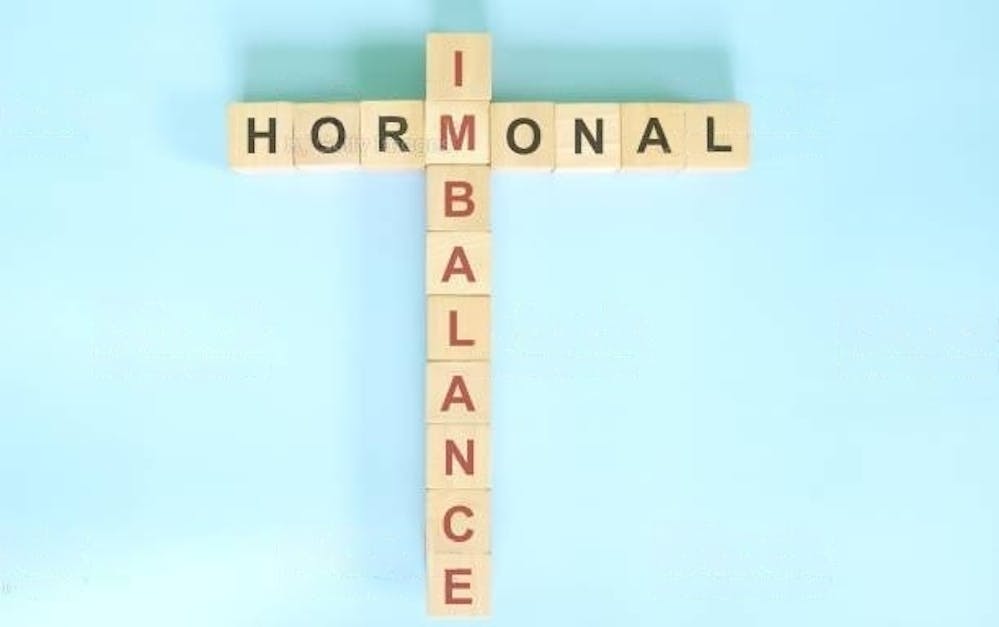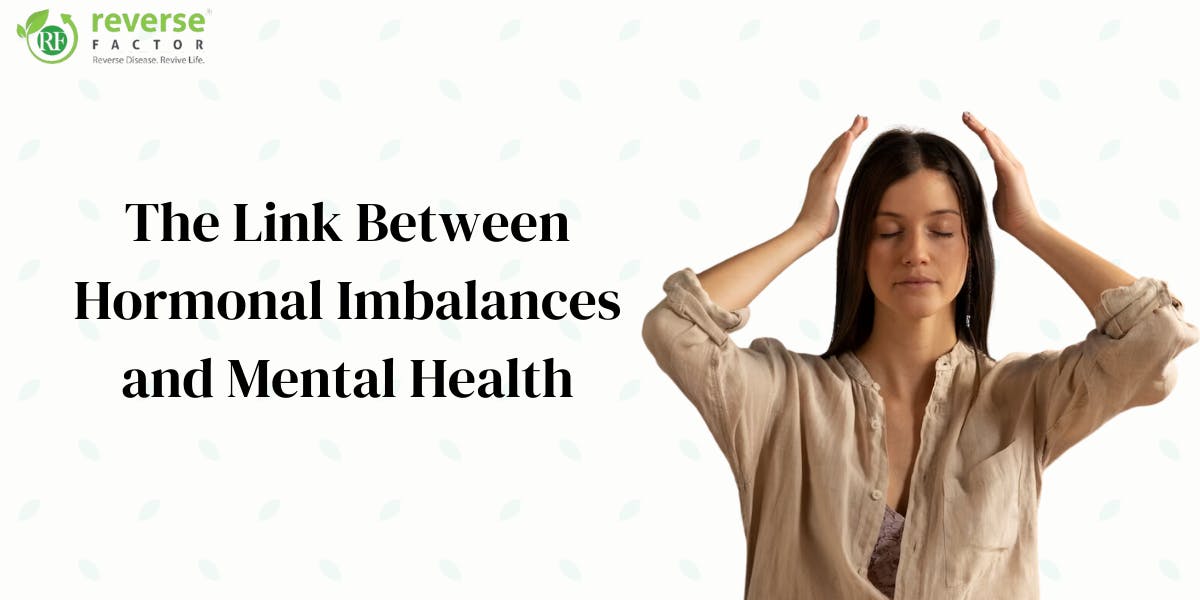Mental health is an important aspect of our well-being and overall health. It impacts how we think, feel, and behave in our daily lives. Good mental health can help you to cope with the struggles of life, maintain good relationships, and achieve your goals. While poor mental health can cause anxiety, stress and depression. Most mental health issues like anxiety, depression or brain fog are the result of hormonal imbalance. Therefore, you must give priority to your mental health as well as understand the root cause of the condition to prevent and treat the underlying issue.
The relationship between hormonal imbalances and mental health has gained a lot of attention in recent years. Living with a hormonal disorder can cause various mental health issues. Whenever there is an excess or deficiency of hormones in the body it is termed as hormonal imbalance. These hormones are chemicals produced by the endocrine system which plays a critical role in regulating various body functions such as metabolism, growth and development, and mood. Whenever there is an imbalance in your hormonal levels, it can lead to various mental health disorders. For instance, imbalances in sex hormones can cause fertility issues. While imbalances in thyroid hormones can lead to weight changes and fatigue.
Taking care of your mental health is just as crucial as our physical health. So, if you are facing any hormonal disorder, then joining a Hormonal Imbalance Treatment in India can help you live a fulfilling life. In today’s blog, we will discuss the link between hormonal imbalances and mental health. This blog also covers the importance of recognizing and treating these imbalances.

Recommended: How to Manage COPD: Lifestyle Changes and More
Science Behind Hormonal Imbalance And Mental Health
Hormones serve as chemical messengers and act as a communication system between cells, tissues, and organs. They tell our bodies what to do when to do and how long. Specific endocrine glands produce these hormones and transport them through the bloodstream to target organs. An imbalance in these hormones can affect our quality of life. The brain and the endocrine system, which produces hormones, are closely connected. Hence, the hormones produced by the endocrine system can influence the function of the brain and nervous system. For example, imbalances in serotonin, dopamine, and cortisol, can lead to depression, anxiety, and brain fog. Imbalances in sex hormones such as estrogen and testosterone can also contribute to mood changes. Mind-body medicine program such as mindfulness meditation and yoga can help you in reducing stress. It promotes relaxation and improves your overall mental and physical well-being.
Must Read: 12 Natural Ways To Reduce Anxiety
Does Hormonal Imbalance Cause Anxiety And Stress?
Both hormonal imbalance and depression are strongly inter-connected. Our body is made of many parts that work together as well as independently to keep you healthy and fine. When one organ isn't working properly, it can lead to multiple problems in the whole body. Mostly, we don’t understand that we are having irregular hormone levels until it leads to a serious health issue. This can make you feel irritable, sad, or tired all the time. Therefore, you must may attention to your body and mind when it feels off. As soon as you realize anything wrong seek hormonal anxiety treatment to prevent any bigger health problems.
See More: Tips For Building A Daily Meditation Practice
Symptoms Of Hormonal Imbalance And Mental Health
Hormonal imbalances can cause a wide range of symptoms in your body that can affect your mental as well as physical health. Some common hormonal depression symptoms include:
- Mood swings
- Irritability
- Anxiety
- Depression
- Fatigue
- Insomnia
- Brain fog
Disease Caused By Hormonal Imbalance
Here is a list of some common health issues caused by hormonal imbalance:
Polycystic Ovary Syndrome (PCOS)
This hormonal disorder mainly affects women in their reproductive age. This condition is characterized by the presence of cysts on the ovaries and irregular menstrual cycles. This is why you should never ignore hormonal imbalance and periods issues.
Premenstrual syndrome (PMS)
This is a hormonal mood disorder that can occur in the days before menstruation.
Hypothyroidism and Hyperthyroidism
Hypothyroidism is a disorder characterized by an underactive thyroid gland, resulting in a deficiency of thyroid hormones in the body.
In Hyperthyroidism, thyroid gland produces a large amount of thyroid hormone which causes symptoms such as weight loss, and anxiety
Diabetes
Diabetes is a chronic illness that affects how the body processes blood sugar. It mainly occurs when your body is not producing insulin properly.
Postpartum Depression Or Anxiety
This mental health condition occurs in women after childbirth. Symptoms of this condition mainly include sadness, and anxiety which are caused by hormonal changes.
Cushing's Syndrome
This is an uncommon hormonal disorder which happens due to long-term exposure to high levels of cortisol hormone. Hormonal imbalance and weight gain can result in high blood pressure and mood swings.
Healthy Habits To Regulate Mental Health And Hormone Imbalance
1. Regular Exercise
Regular exercise can make you feel good as it releases endorphins in your body. When your body is stressed, it releases cortisol, which can disrupt the balance of other hormones. However, exercising regularly can help regulate cortisol levels and minimize the negative effects of chronic stress on your body.
It can help improve mood, reduce anxiety, and alleviate symptoms of depression. Doing regular exercise is the most effective and natural hormonal depression treatment.

2. Meditation
Hormonal imbalance effects on brain and can often result in stress and anxiety. Meditation is a powerful technique for managing stress. Mindfulness meditation can regulate cortisol, which is a hormone that the body releases during stressful situations. Moreover, it can boost concentration, and self-awareness, and encourage a state of relaxation. Incorporating daily meditation into your routine can lead to a happy and healthy life.

3. Talk Therapy
Talk therapy is a powerful way to regulate your hormone levels. Experts believe that talk therapy is an effective way to reduce symptoms of anxiety, depression, and other mental health issues. Engaging in a deep talk with a friend or therapist can help improve your emotional well-being. There is a different form of talk therapy that can help each individual to cope with their health problems.

4. Good Sleep
Lack of sleep can cause mental imbalance and it also impacts your daily life as you will feel tired all the time. Therefore, getting enough sleep is essential for both physical and mental health. Insufficient sleep causes mood swings, and decreased cognitive function. It can also affect hormones that regulate your appetite and metabolism.
You must avoid spending time on phones or laptops before going to bed as it can disrupt your sleep.

5. Plant-Based Diet
Eating a plant-based diet is highly recommended for promoting hormonal balance. Fruits, vegetables, and whole grains can provide your body with essential nutrients. Moreover, a plant-based diet can help you lower the risk of developing type 2 diabetes. It has been found that fruits and vegetables can also lower levels of inflammation in the body. It can help regulate the production and secretion of hormones.. Thus, you should incorporate a plant-based diet into your daily health routine to promote both mental health and well-being.

Final Thoughts:
Hormones play a crucial role in the human body. It acts as chemical messengers that regulate various physiological processes. However, an imbalance in any hormone can significantly impact your overall well-being. It can often lead to a myriad of physical, mental, and emotional challenges. These imbalances can result from various factors, such as stress, poor diet, and exposure to environmental toxins. Hence, it is important to recognize and address these issues in a timely and effective manner to promote optimal health. By taking proactive steps, you can maintain proper hormonal balance, and achieve a better state of well-being.
Frequently Asked Questions –
What Is The Main Cause Of Hormonal Imbalance?
Hormonal imbalances can be caused by medical conditions, lifestyle factors, and aging. Poor nutrition, lack of exercise, and chronic stress can also contribute to hormonal imbalances.
What Are The 5 Hormonal Imbalances?
The five hormonal imbalances are polycystic ovary syndrome (PCOS), thyroid disorders, diabetes, pituitary gland disorders, and adrenal insufficiency.
What Are The Symptoms Of Hormonal Imbalance?
Symptoms of hormonal imbalance may include irregular periods, weight gain or loss, fatigue, mood swings, and infertility.
How Do I Get Rid Of Hormonal Imbalance?
Start consuming a plant-based diet, do regular exercise, practice meditation, and get high-quality sleep to get rid of hormonal imbalances. Symptoms of hormonal imbalance include depression, fatigue, irregular periods, and decreased sex drive.
What Causes Hormonal Imbalance In Males?
Hormonal imbalances in males can be caused by chronic stress, type, and type 2 diabetes, or thyroid disorders.
Can Hormonal Imbalance Cause Depression?
Yes, hormonal imbalance can cause depression. Hormones like cortisol play a role in regulating mood. Any imbalances in these hormones can lead to symptoms of depression.
How Much Time Do Hormones Take To Balance?
With a holistic approach and adopting a healthy diet, and meditation you can regulate your hormonal balance.
Can Hormone Imbalance Cause Depression And Anxiety?
Yes. Hormones such as cortisol, thyroid hormone can all affect mood and contribute to symptoms of depression and anxiety.
How Does Hormonal Imbalance Affect Periods?
Hormonal imbalances can affect periods by causing irregular cycles, or missed periods. Imbalances in estrogen and progesterone can also cause symptoms such as cramping, bloating, and mood changes.
Can Hormonal Imbalance Cause Mental Illness?
Yes, Excessive or reduced hormonal activity can alter brain function. It causes anxiety, depression, and bipolar disorder.
How Hormonal Imbalance Can Be Cured?
You can prevent or cure hormonal imbalances by making lifestyle changes and choosing healthy food options.
What Hormones Are Involved In Mental Health?
Hormones like serotonin, dopamine, cortisol, and thyroid hormones play a major role in mental health. Imbalances in these hormones can contribute to conditions such as depression, anxiety, and brain fog.
Which Hormone Is Responsible For Depression?
No single hormone is solely responsible for depression. Imbalances in serotonin, dopamine, and cortisol are responsible for depressive symptoms.
What Are The 4 Mood Hormones?
The four mood hormones are serotonin, dopamine, oxytocin, and endorphins.
What Hormones Are Involved In Anxiety?
Cortisol and adrenaline hormones contribute to anxiety disorders.




